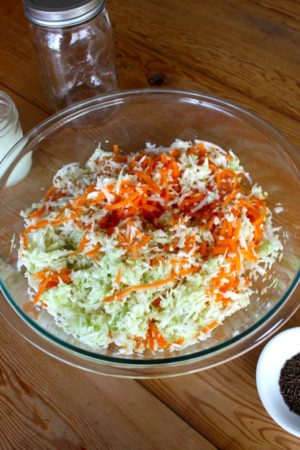
Gut Health - The Facts
"ALL Diseases Begin In The Gut"
- Hippocrates, Father of Medicine.
This is one of the first things I ever learnt in my naturopathy studies and it has proven itself time and again as the years have rolled on. That is why I will be devoting many many weeks to this subject and I welcome you to week 1.
This week, I want to explain the importance of the role of the gut in our health. We will get more into fermented foods in this series, as they play such a large role in repair and maintenance of the gut, but first things first.


THE GUT
Now when I say ‘The Gut’, I am talking about our whole gastrointestinal system or GIT, everything from mouth to anus! To make things clear, this is what I will constantly be referring to as the gut. Our whole gut lining is covered in a beautiful sticky type layer called the mucosal lining.
This lining also has microscopic type hairs or ‘cilia’ which help collect matter and brush it along, down and down she goes. The most recognised or talked about cilia is in the small intestine, when this is damaged irreparably or even in some cases absent, that person is known to have coeliac disease.
Now this gorgeous mucosal lining (stay with me people – once you know about the role of the mucosal lining, you will love it too) has some pretty mind-blowing factors about it.
60% OF OUR IMMUNE CELLS ARE IN OUR GUT
AND
MORE NEUROTRANSMISSION HAPPENS HERE IN THIS LINING THAN IN YOUR PERIPHERAL NERVOUS SYSTEM
I’ll just let that sink in a little. Ok, mind blown? You ready to keep going? Ok.
What this means is that if your gut is not healthy and that mucosal lining has been damaged, you will have a repressed immune system and getting sick all the time AND be most likely depressed, stressed, anxious, not sleeping well, irritable, moody etc. Sound familiar? Unfortunately, for a lot of people it is all too familiar.
What this also means is that food allergies and intolerances are present. Sometimes knowingly, sometimes unknowingly as they are occurring as symptoms outlined above which let’s face it can be put down to all manner of things but guess what? All manner of things leads us back to where? The gut! Good, you’re getting it!
This is why the gut is also known as your second brain – another very clever fellow, Dr Joseph Mercola summed it up very well:
“Most people fail to realize that your gut is literally your second brain, and can significantly influence your mind, mood, and behaviour. But mounting evidence clearly indicates that ignoring your gut may have far-reaching psychological consequences, and it’s becoming increasingly clear that nourishing your gut flora through proper diet, from cradle to grave, is extremely important for proper brain function, and that includes psychological well-being and mood control. Our brain and your gut are actually biologically identical, as they’re created out of the same type of tissue. The greatest concentration of serotonin, which is involved in mood control, depression and aggression, is found in your intestines, not your brain!
I know, I’m blowing your mind right now, aren’t I?
This has been ignored for too long by the medical industry and it is up to people like you and me to start working on the health of our guts and our family's guts and bringing our kids up to know that their ‘tummies’ are so much more than places where our food goes. Every morsel of food we put in our body has the potential to either damage this mucosal lining or keep it healthy and alive.
Mums - if you’ve ever wondered why certain foods change your kids behaviour so quickly, then here is your answer. It affects us adults too, but not as radically and quickly because we have built up a subtle intolerance to the foods and drinks that are doing us damage and our bodies and digestive tracts are larger and therefore it takes longer to impact us, but we feel it.
We get the headaches, we get the mood swings, we get the cramping and changed bowel motions. We get the nausea, the chronic inflammatory conditions in our bones, joints and skin. Oh yes, we get it alright, maybe not straight away but we get it.

So what we will learn in this gut health series is how to repair and take care of our guts.
We will talk about and provide examples of the most important nutrients and foods for gut health and good gut maintenance.
– Good bacteria being of paramount importance. Another really cool thing is this - you know how I keep banging on about the 80/20 rule where to achieve balance in long term health, it’s best to make healthy decisions 80% of the time, which leaves room for 20% of the time to make errors or slip up and be human?
Well get this, we need 80% of good bacteria in our guts for a truly healthy digestive system and we NEED 20% bad bacteria to also maintain a healthy digestive system. Interesting, hey?
This good bacteria will be explored in the blogs with ideas on where to purchase fermented foods and drinks and how to make our own (as seen in week 1). We will also look at probiotic supplements and where and how different cultures reside and act in different parts of our gut.
– Nutrients and amino acids that we can take and eat to repair gut lining.
- Herbs that help with the mucosal lining.
- Flower Essences that work on particular areas of the gut and the emotions that are manifested when these parts are needing help.
- And of course foods and recipes that help repair and maintain gut health.

We will learn about the most common symptoms and dis-ease states of poor gut health.
We will learn about what are the main contributors to poor gut health in areas of diet, lifestyle and environment
We will learn about food intolerances, food allergies, elimination diets and trying to work out the best foods for YOUR body because of course everyone will be different here.
I look forward to sharing this journey with you and I want you to know that I come from a place of learning just like you. All my life I have personally suffered poor gut health which has led to sometimes dramatic conclusions, testings, frustrations and rollercoaster riding (literally, but that’s a whole other story).
I am always open to hear what you have to say and what you have to teach me also. So see you next week for another gut health story.
Read the next installment HERE.
Yours in Health,
Alisha x
Gut Health - The Facts
"ALL Diseases Begin In The Gut"
- Hippocrates, Father of Medicine.
This is one of the first things I ever learnt in my naturopathy studies and it has proven itself time and again as the years have rolled on. That is why I will be devoting many many weeks to this subject and I welcome you to week 1.
This week, I want to explain the importance of the role of the gut in our health. We will get more into fermented foods in this series, as they play such a large role in repair and maintenance of the gut, but first things first.


THE GUT
Now when I say ‘The Gut’, I am talking about our whole gastrointestinal system or GIT, everything from mouth to anus! To make things clear, this is what I will constantly be referring to as the gut. Our whole gut lining is covered in a beautiful sticky type layer called the mucosal lining.
This lining also has microscopic type hairs or ‘cilia’ which help collect matter and brush it along, down and down she goes. The most recognised or talked about cilia is in the small intestine, when this is damaged irreparably or even in some cases absent, that person is known to have coeliac disease.
Now this gorgeous mucosal lining (stay with me people – once you know about the role of the mucosal lining, you will love it too) has some pretty mind-blowing factors about it.
60% OF OUR IMMUNE CELLS ARE IN OUR GUT
AND
MORE NEUROTRANSMISSION HAPPENS HERE IN THIS LINING THAN IN YOUR PERIPHERAL NERVOUS SYSTEM
I’ll just let that sink in a little. Ok, mind blown? You ready to keep going? Ok.
What this means is that if your gut is not healthy and that mucosal lining has been damaged, you will have a repressed immune system and getting sick all the time AND be most likely depressed, stressed, anxious, not sleeping well, irritable, moody etc. Sound familiar? Unfortunately, for a lot of people it is all too familiar.
What this also means is that food allergies and intolerances are present. Sometimes knowingly, sometimes unknowingly as they are occurring as symptoms outlined above which let’s face it can be put down to all manner of things but guess what? All manner of things leads us back to where? The gut! Good, you’re getting it!
This is why the gut is also known as your second brain – another very clever fellow, Dr Joseph Mercola summed it up very well:
“Most people fail to realize that your gut is literally your second brain, and can significantly influence your mind, mood, and behaviour. But mounting evidence clearly indicates that ignoring your gut may have far-reaching psychological consequences, and it’s becoming increasingly clear that nourishing your gut flora through proper diet, from cradle to grave, is extremely important for proper brain function, and that includes psychological well-being and mood control. Our brain and your gut are actually biologically identical, as they’re created out of the same type of tissue. The greatest concentration of serotonin, which is involved in mood control, depression and aggression, is found in your intestines, not your brain!
I know, I’m blowing your mind right now, aren’t I?
This has been ignored for too long by the medical industry and it is up to people like you and me to start working on the health of our guts and our family's guts and bringing our kids up to know that their ‘tummies’ are so much more than places where our food goes. Every morsel of food we put in our body has the potential to either damage this mucosal lining or keep it healthy and alive.
Mums - if you’ve ever wondered why certain foods change your kids behaviour so quickly, then here is your answer. It affects us adults too, but not as radically and quickly because we have built up a subtle intolerance to the foods and drinks that are doing us damage and our bodies and digestive tracts are larger and therefore it takes longer to impact us, but we feel it.
We get the headaches, we get the mood swings, we get the cramping and changed bowel motions. We get the nausea, the chronic inflammatory conditions in our bones, joints and skin. Oh yes, we get it alright, maybe not straight away but we get it.

So what we will learn in this gut health series is how to repair and take care of our guts.
We will talk about and provide examples of the most important nutrients and foods for gut health and good gut maintenance.
– Good bacteria being of paramount importance. Another really cool thing is this - you know how I keep banging on about the 80/20 rule where to achieve balance in long term health, it’s best to make healthy decisions 80% of the time, which leaves room for 20% of the time to make errors or slip up and be human?
Well get this, we need 80% of good bacteria in our guts for a truly healthy digestive system and we NEED 20% bad bacteria to also maintain a healthy digestive system. Interesting, hey?
This good bacteria will be explored in the blogs with ideas on where to purchase fermented foods and drinks and how to make our own (as seen in week 1). We will also look at probiotic supplements and where and how different cultures reside and act in different parts of our gut.
– Nutrients and amino acids that we can take and eat to repair gut lining.
- Herbs that help with the mucosal lining.
- Flower Essences that work on particular areas of the gut and the emotions that are manifested when these parts are needing help.
- And of course foods and recipes that help repair and maintain gut health.

We will learn about the most common symptoms and dis-ease states of poor gut health.
We will learn about what are the main contributors to poor gut health in areas of diet, lifestyle and environment
We will learn about food intolerances, food allergies, elimination diets and trying to work out the best foods for YOUR body because of course everyone will be different here.
I look forward to sharing this journey with you and I want you to know that I come from a place of learning just like you. All my life I have personally suffered poor gut health which has led to sometimes dramatic conclusions, testings, frustrations and rollercoaster riding (literally, but that’s a whole other story).
I am always open to hear what you have to say and what you have to teach me also. So see you next week for another gut health story.
Read the next installment HERE.
Yours in Health,
Alisha x




